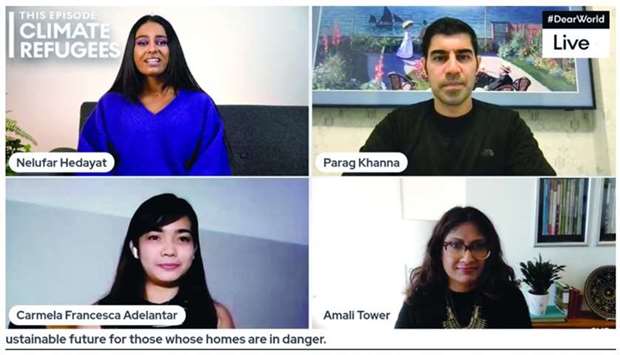As extreme weather conditions triggered by climate change force millions of people around the world to flee their homes, experts are calling on the global community to do more to help the increasing number of victims displaced by pervasive drought, devastating floods, rising sea levels, and scorching temperatures.
Speaking on Doha Debates’ #DearWorldLive programme, a production of Qatar Foundation, climate and migration experts said urgent action is required to address the climate refugee crisis and avert what the United Nations estimates could be the forced migration of up to one billion people by 2050.
Parag Khanna, a global strategy adviser and author of the new book Move: The Forces Uprooting Us, shared a map of the world showing large parts of the Middle East, Africa, the Americas, and South Asia at critical risk of climate-change-driven migration in the decades ahead. “In the 21st century, climate refugees will massively outnumber economic and political migrants,” Khanna said.
Amali Tower, the founder and executive director of the human rights organisation ‘Climate Refugees’ said climate change “disproportionately impacts the world's poorest and violates the human rights of the people on the front lines of this crisis.” She added, “90% of today’s refugees come from countries that are most vulnerable and least ready to adapt to climate change.”
Tower and Khanna both offered suggestions for world leaders to consider as they prepare to gather at the UN Climate Change Conference, also known as COP26, next month in Glasgow, Scotland. Tower believes the “injustice” of climate-related migration and displacement is missing from the Glasgow agenda. While she praised grassroots organisations and activists who address climate refugee challenges at COP26 “side events,” she emphasised that these challenges should “be at the heart of the issues that policy makers should be discussing.”
Khanna voiced concern about whether world leaders would tackle migration issues at COP26: “The one thing they will not agree to is some sort of a global migration accord.” He added, “We must advocate for migration as a fundamental right — perhaps one of the paramount rights of the 21st century.”
The fourth season of #DearWorldLive features three episodes devoted to finding solutions to the world’s climate crisis. The premiere episode on October 13 focused on the impact of food consumption and production on the climate, and the upcoming episode today will examine what can be learned from indigenous people in the fight against climate change.
Parag Khanna, a global strategy adviser and author of the new book Move: The Forces Uprooting Us, shared a map of the world showing large parts of the Middle East, Africa, the Americas, and South Asia at critical risk of climate-change-driven migration in the decades ahead. “In the 21st century, climate refugees will massively outnumber economic and political migrants,” Khanna said.
Amali Tower, the founder and executive director of the human rights organisation ‘Climate Refugees’ said climate change “disproportionately impacts the world's poorest and violates the human rights of the people on the front lines of this crisis.” She added, “90% of today’s refugees come from countries that are most vulnerable and least ready to adapt to climate change.”
Tower and Khanna both offered suggestions for world leaders to consider as they prepare to gather at the UN Climate Change Conference, also known as COP26, next month in Glasgow, Scotland. Tower believes the “injustice” of climate-related migration and displacement is missing from the Glasgow agenda. While she praised grassroots organisations and activists who address climate refugee challenges at COP26 “side events,” she emphasised that these challenges should “be at the heart of the issues that policy makers should be discussing.”
Khanna voiced concern about whether world leaders would tackle migration issues at COP26: “The one thing they will not agree to is some sort of a global migration accord.” He added, “We must advocate for migration as a fundamental right — perhaps one of the paramount rights of the 21st century.”
The fourth season of #DearWorldLive features three episodes devoted to finding solutions to the world’s climate crisis. The premiere episode on October 13 focused on the impact of food consumption and production on the climate, and the upcoming episode today will examine what can be learned from indigenous people in the fight against climate change.

